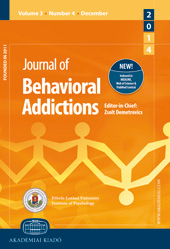The (co-)occurrence of problematic video gaming, substance use, and psychosocial problems in adolescents
The (co-)occurrence of problematic video gaming, substance use, and psychosocial problems in adolescents
Author(s): Antonius J. Van Rooij, Daria J. Kuss, Mark D. Griffiths, Gillian W. Shorter, Tim M. Schoenmakers, Dike van de MheenSubject(s): Gender Studies, Psychology, Behaviorism, Substance abuse and addiction, ICT Information and Communications Technologies
Published by: Akadémiai Kiadó
Keywords: problematic video gaming; Internet Gaming Disorder; online games; adolescents; alcohol; smoking; cannabis; loneliness; depression; negative self-esteem; social anxiety;
Summary/Abstract: The current study explored the nature of problematic (addictive) video gaming (PVG) and the association with game type, psychosocial health, and substance use. Methods: Data were collected using a paper and pencil survey in the classroom setting. Three samples were aggregated to achieve a total sample of 8478 unique adolescents. Scales included measures of game use, game type, the Video game Addiction Test (VAT), depressive mood, negative self-esteem, loneliness, social anxiety, education performance, and use of cannabis, alcohol and nicotine (smoking). Results: Findings confirmed problematic gaming is most common amongst adolescent gamers who play multiplayer online games. Boys (60%) were more likely to play online games than girls (14%) and problematic gamers were more likely to be boys (5%) than girls (1%). High problematic gamers showed higher scores on depressive mood, loneliness, social anxiety, negative self-esteem, and self-reported lower school performance. Nicotine, alcohol, and cannabis using boys were almost twice more likely to report high PVG than non-users. Conclusions: It appears that online gaming in general is not necessarily associated with problems. However, problematic gamers do seem to play online games more often, and a small subgroup of gamers – specifically boys – showed lower psychosocial functioning and lower grades. Moreover, associations with alcohol, nicotine, and cannabis use are found. It would appear that problematic gaming is an undesirable problem for a small subgroup of gamers. The findings encourage further exploration of the role of psychoactive substance use in problematic gaming.
Journal: Journal of Behavioral Addictions
- Issue Year: 3/2014
- Issue No: 3
- Page Range: 157-165
- Page Count: 9
- Language: English

